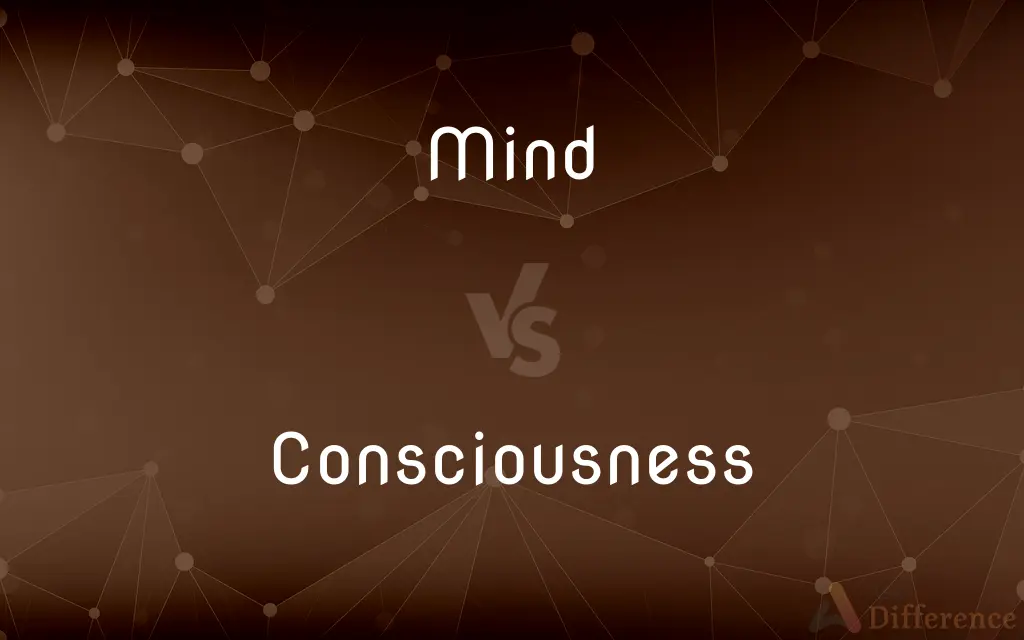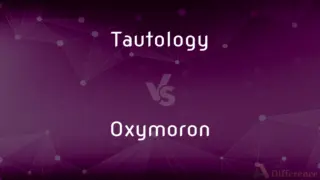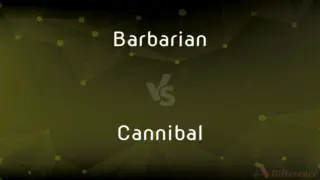Mind vs. Consciousness — What's the Difference?
By Maham Liaqat & Fiza Rafique — Updated on March 18, 2024
Mind and consciousness, though often used interchangeably, refer to distinct aspects of human cognition and awareness. The mind encompasses thoughts, memories, and cognitive functions, while consciousness is the awareness of these processes.

Difference Between Mind and Consciousness
Table of Contents
ADVERTISEMENT
Key Differences
The mind is a complex entity responsible for cognitive functions such as thinking, perception, memory, and decision-making. It is where thoughts, knowledge, and beliefs reside, forming the basis of our intellectual and emotional life. The mind is often considered the "software" of the brain, interpreting information received from the senses and generating responses. Consciousness, on the other hand, is the state of being aware of and able to think about one's own existence, sensations, thoughts, and environment. It is the subjective experience of the mind and the world. Consciousness allows individuals to be aware of their thoughts and feelings, making it possible to reflect upon oneself and the surroundings.
While the mind is the repository and processor of information, consciousness adds a layer of self-awareness and reflection. The mind can function on autopilot, handling routine tasks without conscious effort, whereas consciousness involves a higher level of awareness and attention.
Both the mind and consciousness are central to understanding human behavior and psychology. The mind's capabilities extend to problem-solving and creativity, allowing individuals to innovate and adapt. Consciousness, by enabling self-reflection, plays a crucial role in personal development and ethical decision-making.
Understanding the distinction between mind and consciousness is vital for fields such as psychology, neuroscience, and philosophy. While the mind can be studied through its cognitive functions and behaviors, consciousness poses a challenge due to its subjective nature.
The interplay between mind and consciousness is a subject of ongoing research and debate. How consciousness arises from the physical processes of the mind remains one of the most profound questions in science and philosophy.
ADVERTISEMENT
Comparison Chart
Definition
The set of cognitive faculties including awareness, perception, thinking, judgement, and memory.
The state of being aware of and able to think about one's own existence, sensations, thoughts, and environment.
Focus
Processes and content of cognition and emotion.
Awareness and experience of the mind and external world.
Functionality
Responsible for thoughts, memories, and decision-making.
Enables self-awareness, reflection, and sensory experience.
Study in Psychology
Analyzed through cognitive functions and behaviors.
Explored as a subjective experience and self-awareness.
Philosophical Concern
Often debated in terms of its capabilities and limitations.
Central to discussions on consciousness and existence.
Compare with Definitions
Mind
The mental abilities and processes related to knowledge, reasoning, and judgement.
The mind's capacity to solve complex problems is a hallmark of human intelligence.
Consciousness
The recognition of one's own existence and thoughts.
Meditation increased his consciousness of his inner thoughts and feelings.
Mind
The ability to feel and interpret emotions.
His mind struggled to process the grief of losing a loved one.
Consciousness
The ability to think about oneself and one's place in the world.
The concept of consciousness challenges us to reflect on what it means to be human.
Mind
The creation of thoughts, ideas, and beliefs.
The writer's mind was always buzzing with new story ideas.
Consciousness
The subjective experience of sensory information.
Her consciousness was flooded with the colors and sounds of the festival.
Mind
The function of storing and recalling information and past experiences.
Her mind was a vast library of every book she had ever read.
Consciousness
The state of being awake and aware of the environment.
He regained consciousness after fainting, confused about his surroundings.
Mind
The process of making choices by identifying and analyzing options.
She made up her mind after weighing all the pros and cons.
Consciousness
The personal and unique experience of being.
Consciousness allows for the subjective experience of tasting chocolate for the first time.
Mind
The mind is the set of faculties responsible for mental phenomena. Often the term is also identified with the phenomena themselves.
Consciousness
Consciousness, at its simplest, is sentience or awareness of internal and external existence. Despite millennia of analyses, definitions, explanations and debates by philosophers and scientists, consciousness remains puzzling and controversial, being "at once the most familiar and [also the] most mysterious aspect of our lives".
Mind
The faculty of a human or other animal by which it thinks, perceives, feels, remembers, or desires
Studying the relation between the brain and the mind.
Consciousness
The state of being aware of and responsive to one's surroundings
She failed to regain consciousness and died two days later
Mind
A person of great mental ability
The great minds of the century.
Consciousness
A person's awareness or perception of something
Her acute consciousness of Luke's presence
Mind
Individual consciousness, memory, or recollection
I'll bear the problem in mind.
Consciousness
The state or condition of being conscious.
Mind
Opinion or sentiment
He changed his mind when he heard all the facts.
Consciousness
A sense of one's personal or collective identity, including the attitudes, beliefs, and sensitivities held by or considered characteristic of an individual or group
Love of freedom runs deep in the national consciousness.
Mind
Desire or inclination
She had a mind to spend her vacation in the desert.
Consciousness
Special awareness or sensitivity
Class consciousness.
Race consciousness.
Mind
Focus of thought; attention
I can't keep my mind on work.
Consciousness
Alertness to or concern for a particular issue or situation
A movement aimed at raising the general public's consciousness of social injustice.
Mind
A healthy mental state; sanity
Losing one's mind.
Consciousness
In psychoanalysis, the conscious.
Mind
The thought processes characteristic of a person or group; psychological makeup
The criminal mind.
The public mind.
Consciousness
The state of being conscious or aware; awareness.
Mind
(Philosophy) The phenomena of intelligence, cognition, or consciousness, regarded as a material or immaterial aspect of reality.
Consciousness
The state of being conscious; knowledge of one's own existence, condition, sensations, mental operations, acts, etc.
Consciousness is thus, on the one hand, the recognition by the mind or "ego" of its acts and affections; - in other words, the self-affirmation that certain modifications are known by me, and that these modifications are mine.
Mind
To pay attention to
Mind closely what I tell you.
Consciousness
Immediate knowledge or perception of the presence of any object, state, or sensation. See the Note under Attention.
Annihilate the consciousness of the object, you annihilate the consciousness of the operation.
And, when the steamWhich overflowed the soul had passed away,A consciousness remained that it had left. . . . images and precious thoughtsThat shall not die, and can not be destroyed.
The consciousness of wrong brought with it the consciousness of weakness.
Mind
To be careful about
Mind the icy sidewalk!.
Consciousness
Feeling, persuasion, or expectation; esp., inward sense of guilt or innocence.
An honest mind is not in the power of a dishonest: to break its peace there must be some guilt or consciousness.
Mind
To heed in order to obey
The children minded their babysitter.
Consciousness
An alert cognitive state in which you are aware of yourself and your situation;
He lost consciousness
Mind
To take care or charge of; look after
We minded the children while their parents went out.
Consciousness
Having knowledge of;
He had no awareness of his mistakes
His sudden consciousness of the problem he faced
Their intelligence and general knowingness was impressive
Mind
The capability for rational thought.
Despite advancing age, his mind was still as sharp as ever.
Mind
The ability to be aware of things.
There was no doubt in his mind that they would win.
Mind
The ability to remember things.
My mind just went blank.
Mind
The ability to focus the thoughts.
I can’t keep my mind on what I’m doing.
Mind
Somebody that embodies certain mental qualities.
He was one of history’s greatest minds.
Mind
Judgment, opinion, or view.
He changed his mind after hearing the speech.
Mind
Desire, inclination, or intention.
She had a mind to go to Paris.
I have half a mind to do it myself.
I am of a mind to listen.
Mind
A healthy mental state.
I, ______ being of sound mind and body, do herebynb...
You are losing your mind.
Mind
(philosophy) The non-material substance or set of processes in which consciousness, perception, affectivity, judgement, thinking, and will are based.
The mind is a process of the brain.
Mind
(uncountable) Attention, consideration or thought.
Mind
To bring or recall to mind; to remember; bear or keep in mind.
Mind
To remember.
Mind
To remind; put one's mind on.
Mind
To turn one's mind to; to observe; to notice.
Mind
To regard with attention; to treat as of consequence.
Mind
To pay attention or heed to so as to obey; hence to obey; to make sure, to take care (that).
Mind you don't knock that glass over.
Mind
To pay attention to, in the sense of occupying one's mind with, to heed.
You should mind your own business.
Mind
To look after, to take care of, especially for a short period of time.
Would you mind my bag for me?
Mind
To be careful about.
Mind
To purpose, intend, plan.
Mind
Take note; used to point out an exception or caveat.
I'm not very healthy. I do eat fruit sometimes, mind.
Mind
(originally and chiefly in negative or interrogative constructions) To dislike, to object to; to be bothered by.
I wouldn't mind an ice cream right now.
Do you mind if I smoke?
Mind
The intellectual or rational faculty in man; the understanding; the intellect; the power that conceives, judges, or reasons; also, the entire spiritual nature; the soul; - often in distinction from the body.
By the mind of man we understand that in him which thinks, remembers, reasons, wills.
What we mean by mind is simply that which perceives, thinks, feels, wills, and desires.
Let every man be fully persuaded in his own mind.
The mind shall banquet, though the body pine.
Mind
The state, at any given time, of the faculties of thinking, willing, choosing, and the like; psychical activity or state;
A fool uttereth all his mind.
Being so hard to me that brought your mind, I fear she'll prove as hard to you in telling her mind.
Mind
Choice; inclination; liking; intent; will.
If it be your minds, then let none go forth.
Mind
Memory; remembrance; recollection; as, to have or keep in mind, to call to mind, to put in mind, etc.
Mind
Courage; spirit.
Mind
To fix the mind or thoughts on; to regard with attention; to treat as of consequence; to consider; to heed; to mark; to note.
My lord, you nod: you do not mind the play.
Mind
To occupy one's self with; to employ one's self about; to attend to; as, to mind one's business.
Bidding him be a good child, and mind his book.
Mind
To obey; as, to mind parents; the dog minds his master.
Mind
To have in mind; to purpose.
I mind to tell him plainly what I think.
Mind
To put in mind; to remind.
He minded them of the mutability of all earthly things.
I do thee wrong to mind thee of it.
Mind
To give attention or heed; to obey; as, the dog minds well.
Mind
That which is responsible for one's thoughts and feelings; the seat of the faculty of reason;
His mind wandered
I couldn't get his words out of my head
Mind
Recall or remembrance;
It came to mind
Mind
An opinion formed by judging something;
He was reluctant to make his judgment known
She changed her mind
Mind
An important intellectual;
The great minds of the 17th century
Mind
Attention;
Don't pay him any mind
Mind
Your intention; what you intend to do;
He had in mind to see his old teacher
The idea of the game is to capture all the pieces
Mind
Knowledge and intellectual ability;
He reads to improve his mind
He has a keen intellect
Mind
Be offended or bothered by; take offense with, be bothered by;
I don't mind your behavior
Mind
Be concerned with or about something or somebody
Mind
Be in charge of or deal with;
She takes care of all the necessary arrangements
Mind
Pay close attention to; give heed to;
Heed the advice of the old men
Mind
Be on one's guard; be cautious or wary about; be alert to;
Beware of telephone salesmen
Mind
Keep in mind
Common Curiosities
Can machines be conscious?
Currently, machines lack the subjective experience and self-awareness associated with consciousness, but this is a topic of ongoing debate.
How do scientists study consciousness?
Scientists study consciousness through neurological studies, psychological experiments, and subjective reports.
Can the mind function without consciousness?
Yes, the mind can perform routine tasks without conscious awareness, operating on autopilot.
Is consciousness unique to humans?
While consciousness is most complex in humans, many animals also exhibit signs of consciousness.
Can consciousness be measured?
Direct measurement is challenging due to its subjective nature, but scientists use various indirect methods.
Do all cultures view consciousness the same way?
No, cultural differences influence how consciousness is understood and experienced.
What is the difference between mind and consciousness?
The mind refers to the set of cognitive faculties, while consciousness is the awareness of one's existence and thoughts.
Does consciousness affect behavior?
Yes, consciousness can influence behavior by allowing for self-reflection and deliberate decision-making.
How does consciousness emerge from the brain?
The exact mechanism is unknown, but it is thought to involve complex neural networks and brain functions.
Can consciousness be altered?
Yes, through various means such as meditation, drugs, or brain injury, consciousness can be altered.
What is the relationship between consciousness and memory?
Consciousness and memory are intertwined; memory relies on consciousness for encoding and recall, while consciousness uses memory for self-reflection and identity.
Are dreams a form of consciousness?
Dreams are considered a different state of consciousness, distinct from wakefulness.
How does the mind process emotions?
The mind processes emotions through a complex interplay of brain regions, neurotransmitters, and cognitive appraisal.
Is there a location for consciousness in the brain?
No single location; consciousness likely arises from the interaction of various brain regions.
What role does consciousness play in learning?
Consciousness enhances learning by enabling attention, reflection, and the integration of new information.
Share Your Discovery

Previous Comparison
Tautology vs. Oxymoron
Next Comparison
Barbarian vs. CannibalAuthor Spotlight
Written by
Maham LiaqatCo-written by
Fiza RafiqueFiza Rafique is a skilled content writer at AskDifference.com, where she meticulously refines and enhances written pieces. Drawing from her vast editorial expertise, Fiza ensures clarity, accuracy, and precision in every article. Passionate about language, she continually seeks to elevate the quality of content for readers worldwide.














































